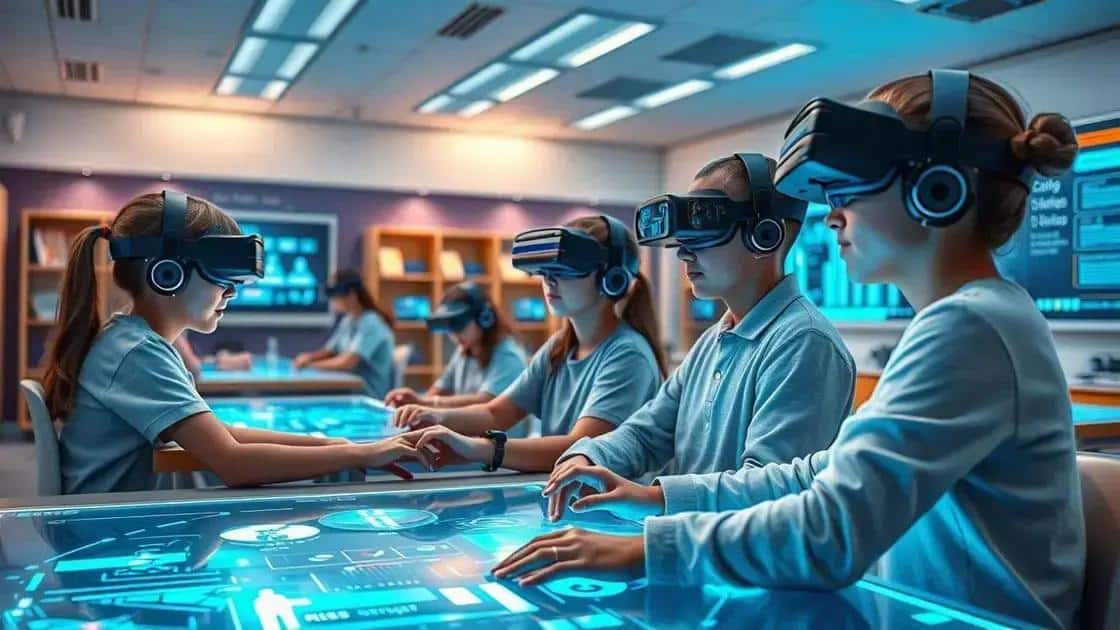Insights on ai in classrooms: transforming education

AI in classrooms enhances student engagement by personalizing learning experiences, providing real-time feedback, and facilitating collaboration among educators, while also facing challenges like technical barriers and ethical concerns.
Insights on ai in classrooms show how artificial intelligence is revolutionizing education. Have you ever wondered how tech can improve learning experiences for students? Let’s dive into this vibrant topic and explore its potential!
The role of ai in enhancing student engagement
The role of AI in enhancing student engagement is becoming increasingly significant in modern classrooms. By leveraging technology, educators can create moreInteractive and tailored learning experiences. This not only keeps students interested but also facilitates better understanding of the material.
Personalized Learning Experiences
With AI, teachers can analyze individual student performance. This allows for the creation of customized lesson plans that cater to each student’s unique learning style and pace. As a result, students feel more connected to the material, which boosts their motivation.
Gamification and Interactive Tools
Educational platforms powered by AI often include gamification elements that make learning fun. For example, interactive quizzes and educational games can boost participation. Below are some key benefits of these tools:
- Increased student motivation and excitement towards learning.
- Immediate feedback that helps students understand their progress.
- Opportunities for collaborative learning among peers.
Furthermore, AI tools enable real-time feedback, allowing students to grasp concepts they might struggle with instantly. This two-way interaction enhances engagement, making the classroom environment more dynamic.
AI-Driven Insights
Teachers can also receive valuable insights from AI about student engagement levels. This data helps in adjusting teaching strategies on the fly. Noticing when students are disengaged means educators can pivot their approach immediately, ensuring that learning stays on track.
Overall, integrating AI in classrooms not only strengthens student engagement but also transforms the learning experience into an interactive journey. By using these tools, both educators and students can benefit greatly.
How ai personalizes learning experiences

AI personalizes learning experiences in exciting ways that cater to the individual needs of students. This technology uses data to assess a student’s strengths and weaknesses, enabling tailored educational content and strategies.
Adaptive Learning Platforms
One major advancement is the use of adaptive learning platforms. These platforms analyze how students learn and adjust the content accordingly. For instance, if a student struggles with math, the system provides additional resources and exercises targeted at that area.
Customized Learning Paths
Students benefit from unique learning paths crafted just for them. With AI, educators can set up personalized objectives that match each student’s pace. This method encourages students to engage actively in their studies.
- Students progress at their own speed.
- Content is relevant to their interests and skills.
- Immediate feedback helps in understanding and retention.
Moreover, AI tools enable frequent assessments that guide instructional adjustments. When students show mastery of a concept, the AI recommends moving on to more complex materials. This keeps the learning process fluid and engaging.
Insights into Student Performance
AI also provides teachers with valuable insights into student performance. By analyzing data from various assessments, teachers can identify patterns and trends that inform their teaching strategies. This collaboration between AI and educators fosters a more responsive learning environment, improving outcomes for all students.
In summary, integrating AI in education personalizes learning experiences that enhance student engagement and success. By tailoring approaches to individual needs, AI transforms the classroom into a more effective learning space.
Challenges of integrating ai in classrooms
The challenges of integrating AI in classrooms are significant but can be overcome with proper planning. While AI offers remarkable opportunities for enhancing education, there are various hurdles that educators and institutions must address.
Technical Limitations
One major challenge is the technical limitations of the existing infrastructure. Many schools lack the necessary hardware and software required to effectively implement AI tools. Without the right technology, teachers and students cannot fully benefit from the features that AI has to offer.
Training and Support for Educators
Another important factor is the need for adequate training and support for teachers. Educators must be equipped with the skills to use AI tools effectively. This includes understanding how to interpret AI-generated data to improve teaching methods. Schools must provide ongoing professional development.
- Workshops on AI tools and their applications.
- Resources to help integrate AI into lesson plans.
- Continuous support channels for addressing questions.
Furthermore, there is often resistance to change within educational institutions. Some staff may be hesitant to adopt new technology, fearing it will replace traditional teaching methods. Open conversations around the benefits of AI can help alleviate these concerns and encourage a more innovative teaching culture.
Ethical Concerns
Ethical concerns also arise with the integration of AI in education. Issues related to data privacy for students must be carefully considered. Schools need to establish clear guidelines on how data is collected, stored, and used. Transparency about these practices can build trust among students and parents.
In summary, while challenges exist in integrating AI into classrooms, proactive strategies can lead to successful implementation. Addressing technical, training, and ethical issues helps create an environment where AI can flourish in the educational sector.
Future trends of ai in educational settings

The future trends of AI in educational settings are shaping a new era for learning and teaching. As technology continues to evolve, we can expect significant advancements that will enhance the classroom experience.
Enhanced Personalization
One major trend is the evolution of personalized learning experiences. AI will increasingly analyze individual student data to create customized learning paths. This means that every student can learn at their own pace and style. For example, adaptive learning platforms will recommend resources tailored to each learner’s needs.
AI-Powered Assessments
Another developing trend is the use of AI-powered assessments. These tools will provide instant feedback to students. Teachers will also receive insights into student performance, allowing them to adjust their teaching strategies effectively. This real-time data can ensure that no student is left behind.
- Automated grading systems will save teachers time.
- Real-time progress tracking will help identify areas needing improvement.
- Personalized feedback will enhance student learning.
Moreover, we can anticipate the integration of virtual and augmented reality through AI, creating immersive learning experiences. Students will have the opportunity to explore environments and scenarios that are otherwise inaccessible. This technology can significantly enhance engagement and retention.
Collaboration Among Educators
The future will also see increased collaboration among educators through AI tools. Teachers will share resources and best practices with one another, fostering a community of innovation. AI can facilitate this by making it easier to access and distribute learning materials across platforms.
As AI continues to advance, its application in education will only grow. The combination of personalized learning, AI-powered assessments, and collaborative tools will create dynamic educational settings that empower both students and teachers.
FAQ – Frequently Asked Questions about AI in Classrooms
How does AI enhance student engagement in classrooms?
AI enhances engagement by personalizing learning experiences and providing interactive tools that cater to individual student needs.
What are some challenges of integrating AI in education?
Challenges include technical limitations, resistance from educators, and concerns over data privacy and ethics.
What future trends can we expect for AI in education?
Future trends include increased personalization, AI-powered assessments, and the use of virtual reality for immersive learning.
How can teachers be supported in using AI technology?
Teachers can be supported through professional development training, resources for lesson planning, and a collaborative environment to share best practices.





